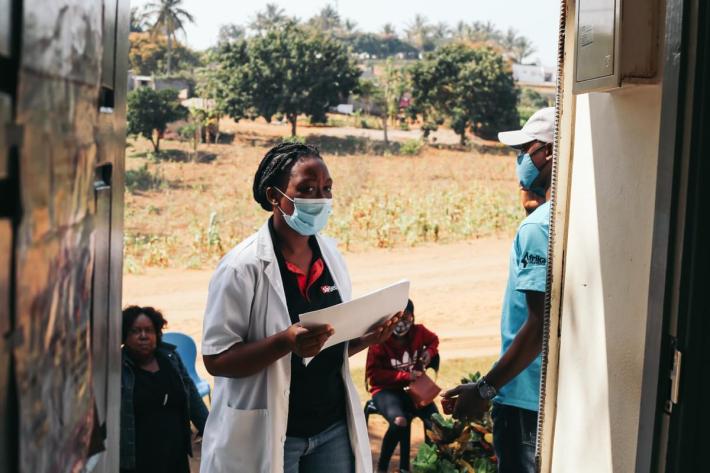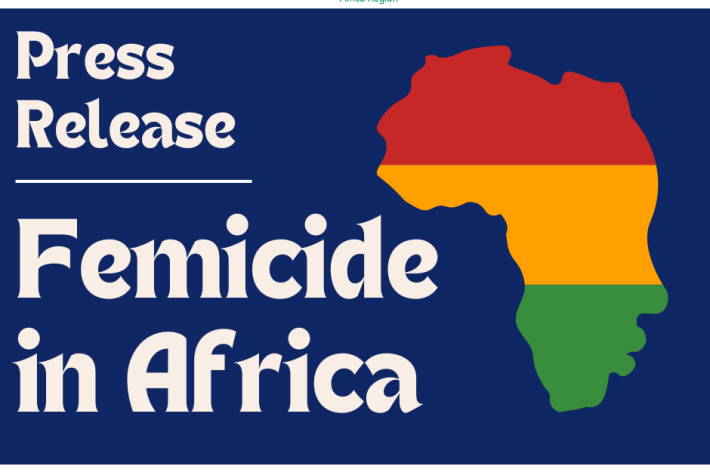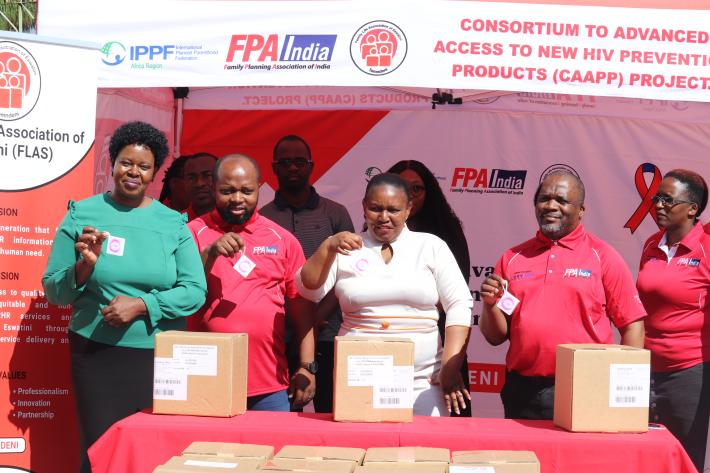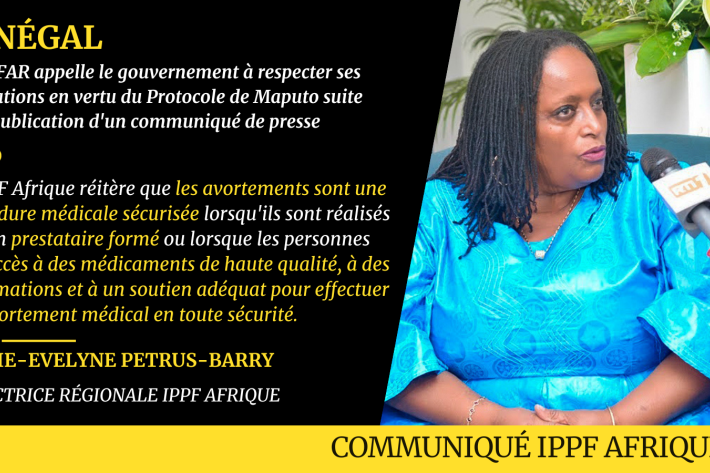Latest press releases
A selection of stories from across the Federation
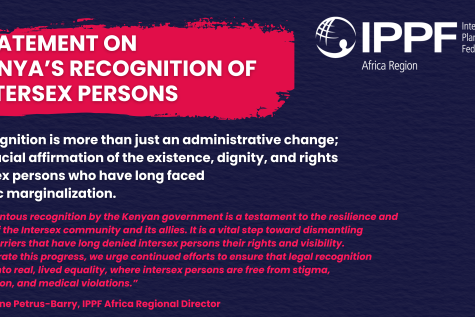
Kenya
IPPF Africa Region Welcomes Kenya’s Landmark Recognition of Intersex Persons
IPPF Africa Region Welcomes Kenya’s Landmark Recognition of Intersex Persons Nairobi, Kenya: 13 February 2025 – On 31 January 2025, Kenya has taken a groundbreaking step towards inclusivity and human rights by officially recognizing intersex as a sex marker alongside male and female in the Kenya Legal Notice 153 of 2025.


| 28 July 2022
IPPF Africa Region Congratulates Gabon on Depenalisation of Same-Sex Sexual Relations
The International Planned Parenthood Federation Africa Region (IPPFAR) congratulates the Gabonese Republic on its recent removal of article 402 (5) in the penal code, which criminalized homosexuality. On 29 June 2020, Gabon’s Senate voted to repeal the country's sodomy law. The vote stood at 59 in favour of repeal, and 17 against. This followed the National Assembly’s vote of 23 June 2020 which saw 48 MPs vote in favour, 24 against, and 25 abstentions. It is now up to the Head of State to promulgate the text. IPPFAR celebrates this significant win with the Gabonese lesbian, gay, bisexual, transgender and intersex (LGBTI) community and activists, including human rights organisations -all of whom have worked tirelessly towards this achievement. IPPFAR is one of the leading organisations at the forefront of advocating for the respect of sexual and reproductive health and rights for all. We strongly believe that no law should criminalize a person’s sexuality, and that no one should be discriminated against because of their sexual orientation. IPPFAR hopes that this recent development in Gabon will inspire other African countries to take a similar approach -that of protecting and upholding the rights of every individual. IPPFAR reiterates its commitment to supporting and working with governments, organizations and individuals in the advancement of sexual reproductive health and rights for all. For more information about the work of IPPF Africa Region, follow us on Facebook and Twitter.

| 28 July 2022
IPPFAR Statement on World Cancer Day 2021
Every year on 4 February, IPPF Africa Region joins the world in marking the World Cancer Day. This is a day set aside to draw attention to the cancer disease and encourage action towards a future free of cancer. This year’s theme is ‘I Am and I Will’, which encourages personal initiative to take the necessary action to combat cancer. Cancer is one of the leading causes of morbidity and mortality worldwide, with approximately 70% of deaths from the disease occurring in low-and middle-income countries, according to the World Health Organization. As a fast-rising major public health concern in many developing countries, cancer leaves behind devastating effects on families, communities and economies. Yet, if detected and treated early, many cancer deaths can be averted. Early diagnosis however remains a great challenge in sub-Saharan Africa. In addition to lack of awareness about cancer risk factors, many health systems across the continent are not fully capable of meeting the demands of early diagnosis, testing, treatment and management. At IPPF Africa Region, we complement government efforts in addressing the health challenges in sub-Saharan Africa. Through our Member Associations (MAs) in 39 countries, we work with different partners: both in the public and private sectors in providing sexual and reproductive health services. One of our focus areas is reproductive health cancers, including breast cancer, cervical cancer, ovarian cancer and prostate cancer. Through our static clinics, mobile clinics and other outreach strategies, our MAs continually create awareness about cancer, by providing information on prevention, risk factors and where they can access related services. Our MAs also offer cancer-related services including visual inspection with acetic acid (VIA) for cervical cancer screening, HPV testing, mammogram screening for breast cancer, and referrals for surgery, radiotherapy, chemotherapy and further management. Between 2017 – 2019, IPPF Africa Region saw an estimated 4,278,029 women tested for cervical cancer. A further estimated 2,398,576 people were tested for breast cancer. Through our clinics, an estimated 97,496 people underwent surgical treatment in the same period. Our contribution to such cancer data is important for the development of cancer control programmes and creation of cancer policies. We are also involved in cancer surveillance and research activities that inform the development of reproductive cancer drugs and vaccines. Our advocacy efforts include calling on African leaders to prioritize the health agenda in their countries and follow up on their commitment to various health instruments such as the Abuja Declaration. The Abuja declaration requires African countries to commit at least 15% of their annual budgets to improving the health sector. The health of any country begins with an individual so on this day, we urge all of us to make a personal commitment to take various actions that will reduce the cancer burden in our countries. It is our responsibility to ensure that we go for regular screening and testing, avoid risk factors that predispose one to cancer, advocate for cancer prevention, treatment and management, including speaking out in support of research, as well as advocate for the implementation of international commitments to health care in our countries. What we do today matters towards the realization of a cancer-free future.

| 28 July 2022
Statement In Support Of Pregnant School Girls In Tanzania
IPPF Africa Region is concerned about the alleged statement by Tanzanian President HE John Pombe Magufuli. The warning that schoolgirls who have given birth should not be allowed to return to school is contrary to Regional and Global policy commitments that seek to protect Africa’s Youth, to which the United Republic of Tanzania is a signatory. The Republic of Tanzania has ratified several protocols at the continental level – and these include the Banjul Protocol, the Maputo Protocol and most recently the Maputo Plan of Action 2016-2030. The Banjul Protocol specifically states in article 17 that ‘Every individual shall have the right to education” and part of article 18 declares that “The State shall ensure the elimination of every discrimination against women; and also ensure the protection of the rights of women and the child as stipulated in international declarations and conventions.” Education is not only a human right in itself, but also enables access to almost all other human rights (UNESCO, 2016). The right to education is enshrined in Article 26 of the Universal Declaration of Human Rights (United Nations, 1948). Equal access to quality education is also an objective of Africa’s Agenda 2063 and the United Nations 2030 Agenda for Sustainable Development. When a girl is not enrolled, or is pulled out of school for any reason whatsoever, her rights are violated, her opportunities are lost and her future options are limited. In light of the above, we would like to appeal to the government of the United Republic of Tanzania to review its overall position on the status of the girl child in the context of the Demographic Dividend, Maputo Plan of Action, Maputo Protocol and the African Youth Charter. We firmly believe that Africa can harness the Demographic Dividend through investing in youth, particularly young girls if their rights are preserved.

| 26 June 2022
U.S Supreme court overturns Roe v. Wade in biggest blow to women's health and rights in recent history
Nairobi – 25 June 2022 – The decision by the US Supreme Court to overturn the landmark Roe V Wade on abortion will trigger total or near total bans on abortion care in approximately 26 states across the United States of America. This decision not only affects the United States but undoubtedly we will see a ripple effect across the world. Overturning Roe v. Wade is the biggest blow to women's health and rights in recent U.S history. It removes 50 years of safe and legal abortion across the U.S. and puts the lives of millions of women, girls and gender diverse people into the hands of state legislators – many of whom are Conservative extremists who are anti-woman, anti-LGBTI+ and anti-gender. By continuing this attack on women's bodies and forcing them to carry pregnancies to term, the highest court in the United States has reached its lowest point, robbing millions of their liberty, bodily autonomy and freedom - the very values the United States prides itself on. The decision is also out of step with the America people, the majority of whom support access to abortion care. "The fallout from this calculated decision will also reverberate worldwide, emboldening other anti-abortion, anti-woman and anti-gender movements and impacting other reproductive freedoms. The justices who put their personal beliefs ahead of American will, precedent and law will soon have blood on their hands, and we are devastated for the millions of people who will suffer from this cruel judgment", said Dr Alvaro Bermejo, Director of the International Planned Parenthood Federation. “We know from our experience in sexual and reproductive health and rights that extremist groups and lawmakers opposed to gender equality have fought long and hard to control women’s and girls’ bodies. These groups play politics with the bodily integrity of women and girls, denying scientific findings and challenging well-grounded evidence that banning abortion does not stop women from choosing to have the procedure, only forcing them to turn to potentially dangerous alternatives. These groups also force health care providers to choose between saving a woman’s life and facing criminal charges. There is no such thing as preventing abortion; there is only banning safe abortion”, said Marie-Evelyne Petrus-Barry, International Planned Parenthood Federation, Africa Region (IPPFAR) Regional Director. She further added that “while the US may be regressing and rolling back on the human rights of women and girls, we now look to other countries including Benin and Kenya, which have recently signalled their commitment to protecting and fulfilling the rights of women and girls to access safe abortion care. These countries now lead the charge, and we as global voices in reproductive rights worldwide, must continue working hard to make these rights a reality, while maintaining and building on them.” END Media Contacts: Mahmoud Garga, Lead Specialist - Strategic Communication, Media Relations and Digital Campaigning, IPPF Africa Regional Office (IPPFARO) – email: [email protected] -Phone +254 704 626 920 ABOUT IPPF AFRICA REGION (IPPFAR) The International Planned Parenthood Federation Africa Region (IPPFAR) is one of the leading sexual and reproductive health (SRH) service delivery organization in Africa, and a leading sexual and reproductive health and rights (SRHR) advocacy voice in the region. Headquartered in Nairobi, Kenya, the overarching goal of IPPFAR is to increase access to SRHR services to the most vulnerable youth, men and women in sub-Saharan Africa. Supported by thousands of volunteers, IPPFAR tackles the continent’s growing SRHR challenges through a network of Member Associations (MAs) in 40 countries. We do this by developing our MAs into efficient entities with the capacity to deliver and sustain high quality, youth focused and gender sensitive services. We work with Governments, the African Union, Regional Economic Commissions, the Pan-African Parliament, United Nations bodies among others to expand political and financial commitments to sexual and reproductive health and rights in Africa. Learn more about us on our website. Follow us on Facebook, Twitter, Instagram and YouTube.

| 30 May 2022
Opinion: Stepping up to contain the Roe v. Wade shock wave in Africa
On May 2, a leaked draft opinion from the U.S. Supreme Court hinted at a likely overturning of the landmark 1973 decision in the case of Roe v. Wade, which effectively legalized abortion across all U.S. states and allowed women to choose to have the procedure without excessive government restriction. Fifty years later, this latest attack on reproductive freedoms could have ripple effects across the U.S. and the rest of the world. Access to abortion care is a human right, essential for guaranteeing the health and reproductive rights of women and girls everywhere. While the U.S. may be regressing and denying the human rights of women and girls, we now look to countries such as Benin and Kenya, which have recently signaled their commitment to protecting and fulfilling the rights of women and girls to access abortion care. Read the rest of this article here, as published by Devex.

| 13 May 2022
Stepping up to contain the Roe v Wade shock wave in Africa: Marie-Evelyne Petrus-Barry and Nelly Munyasia
By Marie-Evelyne Petrus-Barry and Nelly Munyasia. Last month, the High Court of Malindi in Kenya ruled that abortion care is a fundamental right under the Constitution of Kenya and that arbitrary arrests and prosecution of patients and healthcare providers for seeking or offering abortion services is illegal. The High Court further confirmed that criminalizing abortion under Penal Code without Constitutional statutory framework is an impairment to the enjoyment of women’s reproductive right and directed the Parliament of Kenya to enact an abortion law and public policy framework that aligns with the Kenyan Constitution. This incredible result was made possible owing to the efforts of Reproductive HealthNetwork Kenya (RHNK), a network of health professionals within private and public facilities committed to comprehensive sexual reproductive health and rights (SRHR), advocacy, and service provision, and the Centre for Reproductive Rights (CRR), a non-profit legal advocacy organization dedicated to promoting and defending reproductive rights worldwide. According to Guttmacher, globally over 120 million unintended pregnancies occurred each year between 2015 and 2019, 61% of which ended in abortion. In countries that restrict access to abortion, the percentage of unintended pregnancies ending in abortion has increased over the past 30 years, from 36% in 1990–1994 to 50% in 2015–2019. Last week, a leaked draft opinion from the United States (US) Supreme Court hinted at a likely overturning of the 1973 landmark Supreme Court decision in Roe V Wade which effectively legalized abortion across all US states. When Roe V Wade was passed some 50 years ago, it set the standard for progressive laws worldwide allowing women to choose to have an abortion without excessive government restriction. 50 years later, the possibility of retrogressing this constitutional commitment in the US and in the rest of the world is looking more likely than ever. Such a decision would de facto open the floodgates of arrests and prosecution of patients and healthcare providers seeking or offering abortion services both in the United States and across the world. Such a move from a global power would also give grist to the anti-abortion mill worldwide, granting anti-abortion groups traction, funding, and legitimacy, and disrupting already scant services and scarce funding to civil society organisations that support the right to abortion care. In 2020, an investigation by the media organisation, Open Democracy, revealed that US right wing funding was behind “pregnancy crisis centres” which claim to provide “advice” to pregnant women but really advocate against termination of pregnancy and the right to abortion care. Moreover, if anti-abortion groups increase or expand, sexual and reproductive health and rights networks will have to redirect their energy towards stopping harmful reproductive coercion against women’s or couples’ will instead of focusing efforts on holding their governments accountable to expanding access and implement existing abortion legislation efficiently. While lawmakers have made progress in parts of the world, they have walked back on the advances made in others. They deny the science and play politics with women’s bodily integrity challenging well-grounded evidence that banning abortion does not lead to fewer women seeking or opting for abortions; and regrettably forcing women who want to safely end a pregnancy to turn to dangerous alternatives. They also oblige healthcare providers to choose between saving a woman’s life and facing criminal charges and jail time. As evidence demonstrates, there is no such thing as prohibiting abortion. There is only banning safe abortion. Fundamental reproductive rights are under attack by anti-gender and anti-rights extremists, guised in lawmakers’ cloaks. We know from our experience of working on ensuring sexual and reproductive health and rights (SRHR), in Kenya and in the rest of the world, that anti- rights and anti-gender opposition groups have fought long and hard to control women’s bodies and deny them their reproductive rights. Nelly Munyasia- Executive Director Reproductive Health Network Kenya (RHNK). “As a service providing organisation, we have faced numerous challenges including provider arrest, harassment and extortion by the police. We have witnessed the opposition targeting and threatening our providers including protesting in front of their clinics and launching hateful online petitions. This development in the US is moving us backwards and taking away women’s rights, reducing their ability to achieve their full potential in society. It will also have economic implications for decades to come. This equally puts health care providers at risk of violence and abuse by the opposition, and harassment by the police.” Marie-Evelyne Petrus-Barry, Africa Regional Director, International Planned Parenthood Federation of whom RHNK is a collaborative partner added: "Access to abortion care is a human right, essential to guarantee the health and reproductive rights of women and girls everywhere. At IPPF, we are committed to reducing the number of deaths of women and girls who are forced to turn to unsafe abortion methods for fear of arrests and harassment. In partnership with our Collaborative Partner, RHNK and other powerful voices in the region and beyond, we will continue to supply and support safe and legal abortion services and care for women and girls everywhere, challenge regressive laws and protect the rights of women and girls to have autonomy over their own bodies, including to safely end a pregnancy if they so wish." Now more than ever, we must take a stand against this erosion of a woman’s fundamental right to her own bodily autonomy. Working in silos is no longer an option. As a global SRHR ecosystem, we must come together, protect past hard-fought wins, mobilise, and strategize to protect women and girls’ rights, including their right to abortion care. **END*** Marie-Evelyne Petrus-Barry is the Africa Regional Director at the International Planned Parenthood Federation (IPPF). Born in Guadeloupe, she has over 30 years of international human rights experience and leads her team to advocate, promote, and deliver sexual and reproductive health and rights in 42 sub-Saharan countries. Her leadership helps ensure that IPPF Africa Region, through locally owned organizations, protects and safeguards the rights of the most vulnerable in society. Nelly Munyasia is the Executive Director at Reproductive Health Network Kenya (RHNK) a network of trained and committed providers ensuring access to quality and comprehensive SRHR. She is a trained nurse-midwife and a health systems expert. Nelly is an award-winning global citizen committed to championing and advocating for quality sexual and reproductive health for women, girls and young people.











